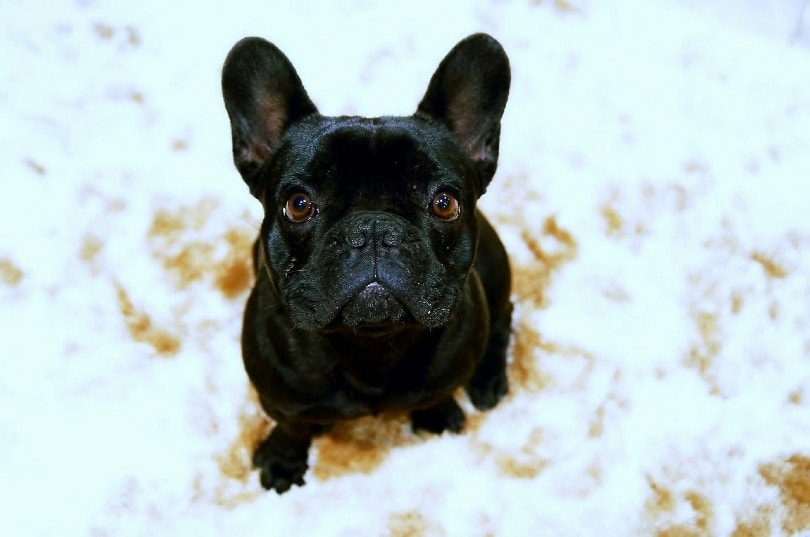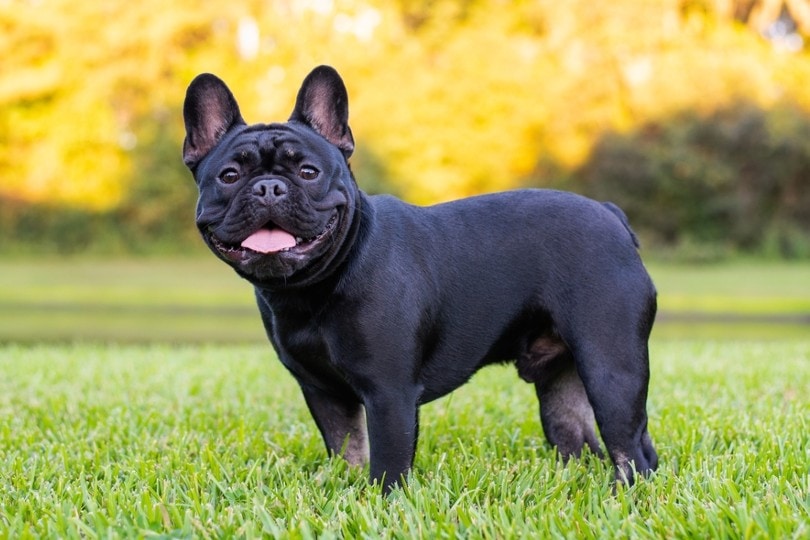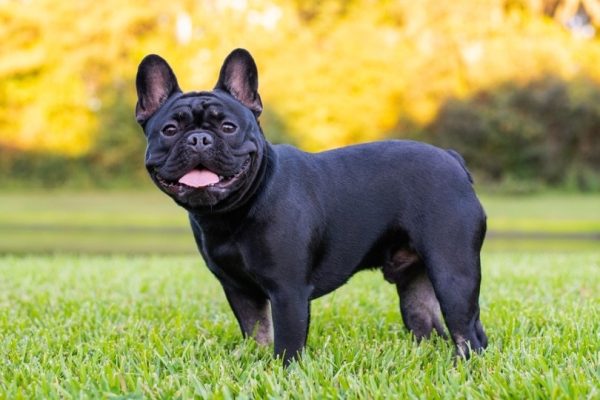Click to Skip Ahead
The upright ears, the short, robust body, and the quirky attitude all remind us of one breed: the French Bulldog.
French Bulldogs are known as the class clown of dog breeds. It could be their wobbly walk or their skyscraper ears. It could also be their personality. They love showing off for attention, whether for an owner or stranger. They also come in many colors like brindle, cream, fawn, and sable. Some of these colors aren’t allowed by the American Kennel Club, either, and the Black French Bulldog is one of them.
Breed Overview
Height:
Small to medium (11 – 12 inches)
Weight:
20 – 28 pounds for males, 16-24 pounds for females
Lifespan:
10 – 12 years
Colors:
Fawn, fawn and white, fawn brindle, brindle, brindle and white, cream, white and brindle, white and fawn
Suitable for:
Families looking for a playful, easy-to-groom lapdogs that does not require a lot of space.
Temperament:
Easygoing, sociable, gentle, friendly, playful, affectionate
Today, we’re looking at the black Frenchie, the rarest (and most expensive) of the French Bulldog colors. We’re discussing how the breed came to be, when the black coat coloring started appearing, and why the black color is undesirable.
Let’s get started.
French Bulldog Characteristics
The Earliest Records of the Black French Bulldog in History
French Bulldogs originated in England in the late 19th century, around the time of the industrial revolution. At this time, bulldogs were more muscular and taller than the Bulldog breed we see today.
Bulldog breeders fiddled with bulldog genetics to create different breed modifications. One of these modifications was a mini bulldog with upright ears, a short lower jaw, and a round forehead—otherwise known as the French Bulldog.
English lacemakers primarily took notice of this breed. When the industrial revolution closed down many crafting shops, English lacemakers relocated to France, taking their mini bulldogs with them. During this time, the Frenchie rose to fame, but the only colors you saw were your standard brindle and fawn French Bulldogs.
Frenchies were seen everywhere in France, from hotels and cafes to churches and brothels. It didn’t take long for wealthy American travelers to notice these adorable little bullies and take them home to the United States.

How the Black French Bulldog Gained Popularity
Since a French Bulldog doesn’t produce a black coat naturally, it’s hard to say when this color grew in popularity. The AKC doesn’t carry documentation about this fur color, and finding someone who breeds Black Frenchies is difficult because of the health issues. So, we can’t say for sure how the Black French Bulldog specifically became popular.
We know that French Bulldogs are America’s second most popular breed. So, people love their Frenchies. French Bulldog owners often want to buy a Frenchie with a coat color approved through the AKC and the French Bulldog Club of America (FBCDA). But some people will pay a hefty price for a Black French Bulldog.
Until we see more responsible breeding and approval from the AKC or FBCDA, we won’t know any more information about this type of Frenchie.
Formal Recognition of the Black French Bulldog
The French Bulldog Club of America (FBDCA) was formed in 1897 and set the standard for the bat ears, the most defining part of the French Bulldog. In 1911, the FBDCA set color standards for the Frenchie. Unfortunately, the black French Bulldog wasn’t accepted.
French Bulldogs already have several health issues, but Black Frenchies have the worst among all the colors because of the dominant black gene mutation. They don’t carry the gene that creates a brindle coat coloring. In other words, Black Frenchies aren’t natural.
French Bulldogs without brindle can carry the deaf gene and possibly face eye problems in the future. For this reason, the AKC and the FBDCA don’t recognize Black French Bulldogs.


Top 3 Unique Facts About the Black French Bulldog
Now that we know where the Black Frenchie came from let’s talk about some interesting facts about this breed.
1. Black Frenchies are sometimes mixed with Pugs.
One way to create a black coat color on a French Bulldog is to breed it with a Pug with dominant black genes. But you can’t really call it a Black French Bulldog because 50% of the genes are Pug. It’s also not a good idea because Pugs have similar health issues that will only intensify in a puppy.
2. Black Frenchies are rare.
Since Black Frenchies aren’t accepted as a standard color by the AKC or FBDCA, many breeders don’t bother breeding the color. Still, some breeders take their chances and earn a high profit from this rare color. Black Frenchies go for no less than $4,500.
3. French Bulldogs were used as conversation starters in brothels.
While in France, French Bulldogs were often seen in brothels and roaming the streets with prostitutes. Men seeking companionship would sometimes be awkward during the first encounter, so the French Bulldogs helped start the conversation.

Does the Black French Bulldog Make a Good Pet?
To say the French Bulldog makes a good pet is an understatement. French Bulldogs are intelligent, playful, and amusing. You’ll never be bored with a Frenchie.
Generally, French Bulldogs love children and other pets but may try to compete for attention. But you shouldn’t worry too much about competition since Frenchies appreciate alone time. French Bulldogs also adapt to their surroundings. They’re especially great for apartment dwellers because they hardly ever bark and only have a moderate amount of energy to burn.
French Bulldogs make excellent pets, but you should find a different color of Frenchie instead of a black one. These dogs are overpriced and face more health issues than the approved French Bulldog colors. Things may change in the future with breeding regulation. But until then, it’s best to shop around for other Frenchie colors.

Conclusion
French Bulldogs are here to make the world a better place. But sometimes, this comes at a price. America can’t get enough of the French Bulldog, which means creating a coat color that puts the dog at risk for health issues.
If you are dreaming about the day you can own a French Bulldog, it’s best to avoid a black one. As long as you stick with a French Bulldog with approved coat color, you shouldn’t have to worry about additional health issues. Plus, your Frenchie will still have the desired French Bulldog antics everyone loves, regardless of coat color.
Related Reads:
- What Were Bulldogs Bred For? History, Ancestors & Anatomy
- 8 Best Dog Foods for American Bullies – Reviews & Top Picks
Featured Image Credit: Tanya Consaul Photography, Shutterstock











